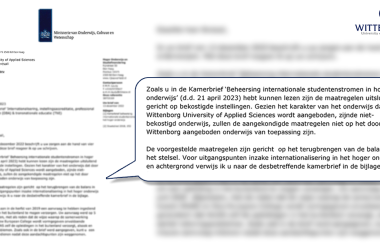Dutch Election Result - Wittenborg Explains
Dutch Election Result - Wittenborg Explains

"As you embark on reading this article, I'd like to underscore a fundamental aspect of Wittenborg: our unwavering commitment to being an international business school. At Wittenborg, we offer bachelor's, master's, and MBA programmes, all conducted entirely in English, reflecting our dedication to global education standards. Central to our ethos is the celebration of internationalisation, diversity, and inclusion. We proudly welcome students, faculty, and staff from every corner of the globe, embracing individuals from diverse backgrounds, religions, and ethnicities. As proponents of globalisation, we at Wittenborg champion the principles of social liberalism, which have been instrumental in shaping the Netherlands' success on the world stage.”
Peter Birdsall, President, Wittenborg University of Applied Sciences
One week has passed since the Dutch general elections were held. In a significant shift, the incumbent government led by Mark Rutte, known for its social liberalist policies, faced a setback as voters redirected their support. This resulted in the governing parties losing seats to various populist factions, both established and emerging. Contrary to the expectations of those not closely following the political debates, Geert Wilders' Party for Freedom (PVV), known for its far-right stance, secured a notable victory, winning 37 of the 150 parliamentary seats.
"A New Era in Dutch Politics: Wilders' Victory and Its Implications for International Education"
In a remarkable turn of events, Geert Wilders' party has emerged victorious in the Dutch elections, securing 37 of the 150 seats in parliament with approximately 24% of the popular vote. This result signifies a pivotal moment in Dutch politics, as it highlights the division in voter preferences, with a significant 76% not opting for Wilders' vision.
The election saw the centre-left GroenLinks-PVDA securing 25 seats, followed by the centre-right VVD with 24 seats, and NSC claiming 20 seats.
Importantly, Wilders' victory, while substantial, does not afford him an outright majority. Consequently, he faces the (difficult) task of forming a coalition government, a common practice in Dutch politics, requiring collaboration with two or more parties to reach the majority threshold of 76 seats.
There is already talk of a new election looming as Wilders may not be able to gain support to form a government.
Wilders' Controversial Agenda: Causes for Concern
Wilders' sometimes extremist political objectives have raised eyebrows and concerns, especially among international education professionals. His agenda includes:
- Drastically reducing the number of international students at Public Universities. This is to be achieved by forcing the public universities to teach all their programs at undergraduate level in Dutch language, and also maintain a quota for international students in the masters program.
- Closing the nation's borders.
- Proposing a "Nexit" referendum (leaving the EU)
- Terminating free labour movement within the EU (requiring withdrawal from the EU)
- Opting out of EU regulations on asylum and migration (requiring withdrawal from the EU).
- Banning Islamic symbols and institutions, including the Quran, mosques, and Islamic schools(Requiring the Dutch constitution to be re-written).
- Withdrawing from the UN's Paris climate agreement.
"We believe that none of these key elements in Wilders' ideology are at all feasible to implement. He would literally need to become totalitarian leader without any requirement for a democratic government to achieve these goals. That is never going to happen in The Netherlands."
Birdsall
Analysing the Realism of Wilders' Plans
The question arises: how feasible are Wilders' proposals? For international education professionals, there's a valid reason for concern, but the situation may not be as dire as it appears.
Legal and Political Limitations
- The bulk of migration law, including regulations affecting students and refugees, falls under EU and international treaties, making unilateral decisions challenging.
- International students and researchers enjoy protection under EU law.
- While the new government might advocate for reducing English-taught programmes and necessitating Dutch language learning for international students, this does not entirely preclude the feasibility of studying in the Netherlands.
- A Nexit referendum appears highly unlikely, given the complete lack of majority support from potential coalition partners.
"Wittenborg is an independently funded institution of higher education, which means it does not fall under the financial control of the state. However, the state does oversee its quality and programs. As a result, it is not feasible for any external entity to mandate Wittenborg to decrease its number of international students or to offer its bachelor's degree programs in Dutch. We are gratified to confirm that we have received correspondence from the director of higher education affirming this stance."
Birdsall
The Road Ahead: Compromise and Collaboration
Wilders' ambitious agenda, encompassing international education, immigration, EU relations, and sustainability, faces a significant hurdle: the lack of a majority. This necessitates compromises and collaborations with other parties to form a government, potentially diluting the extremity of his proposals.
The Role of Stakeholders in International Education
Despite these reassurances, there remains a reason for concern. Stakeholders in international education must now advocate more vigorously for their sector, focusing on:
- Emphasising to Dutch society, political parties, government, and the private sector the vital and positive impact of international students on the economy, education system, global standing, job market, research, science and future.
- Continuously welcoming international students of all nationalities and religions, reinforcing their valued presence in the Netherlands.
In conclusion, while Wilders' victory marks a significant shift in Dutch politics, it is crucial to remember the checks and balances inherent in the system. The path ahead may be bumpy, but it is not insurmountable, especially with proactive engagement and advocacy from concerned parties.
WUP 29/11/2023
by James Wittenborg
©WUAS Press
932 words